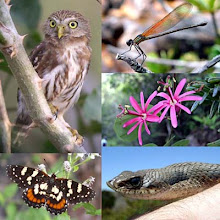About half of our group did the somewhat difficult walk to the boulder field to look for Short-tailed Finch at the base of a boulder field at about 13,500 feet elevation. We missed the Short-tailed Finch, alas, but did get a couple other new birds, such as a male Black Siskin and a Plain-breasted Earthcreeper.
We also enjoyed these clumps of blooming cactus, perhaps a species of Lobivia.
Martin and I walked back and as we started traversing a wet area, I started to mention that there was a record of Diademed Sandpiper-Plover from somewhere in these mountains, but it wasn't recent, the date, exact location, and observer not well known. In other words, it's not a bird one could actually expect to find here. Just a few seconds later, I looked up to see three birds scamper in front of us – two Cream-winged (Bar-winged) Cinclodes and this Diademed Sandpiper-Plover! This was my most wanted bird in Bolivia, but I had long since resigned to having to look for it in Peru or Chile where everyone else sees them. It would just have wait until I had a chance to get there. Wow, what a thrill.
We also did really well with other birds, finding Rusty-browed and Bolivian Warbling-Finches (completing the genus Poospiza in Bolivia), Torrent Duck, and getting much better views of Giant Hummingbird and Red-tailed Comet. The weather was nicer today, with the wind from yesterday abating by about 10:30 and making for a very pleasant picnic lunch and afternoon. The haze and smoke had cleared, and we had a nice view of Cochabamba in the valley below.










Congrats on a great species. One of my favorites.
ReplyDeleteGreat pic of the S-P. One of my fantasy shorebird trifecta. Now you need Spoon-billed Sandpiper and Ibisbill....
ReplyDeleteLooks like lobivia caespitosa to me
ReplyDelete